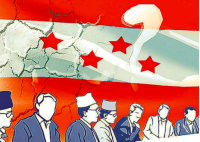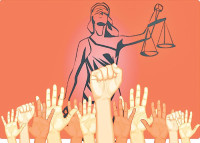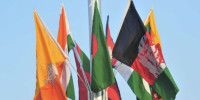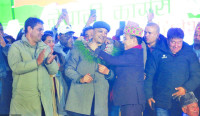Opinion
Dodging peril
Federalisation based on ethnic and regional segregation will undermine national unity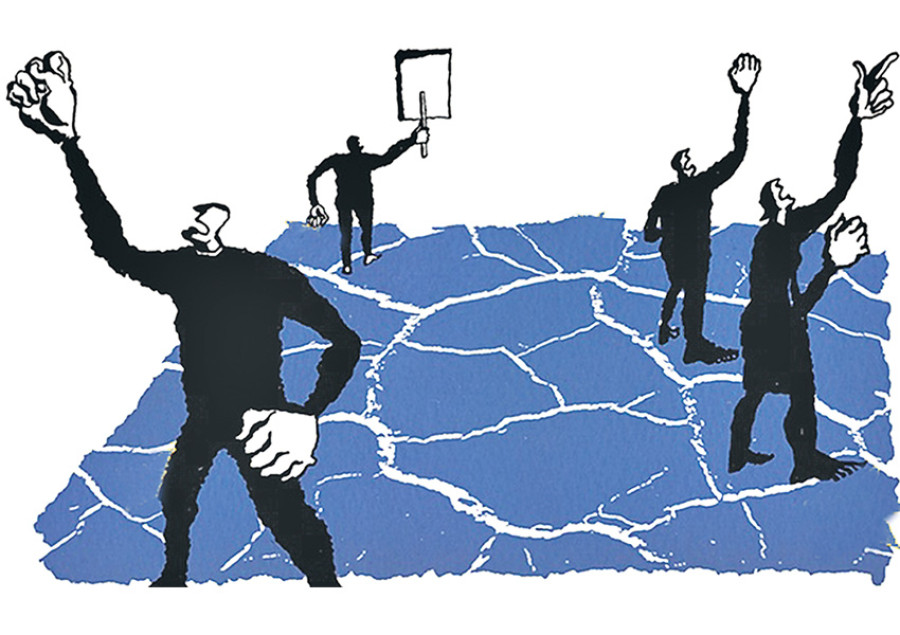
Jainendra Jeevan
Ethnocentric federalisation of the hitherto unitary state to compensate for the marginalisation and injustices of the past was never a politically correct notion in the first place. State restructuring should never be based on the principles of retribution. Also, such proposition lures various ethnic communities to agitate for more provinces of their own. We have 125 ethnic/caste groups; what will happen when all or many of them agitate for their own states? Keep on fragmenting the tiny nation? Will such tiny and poor states be viable?
We should never forget that we are not an island nation. We are landlocked between two of the largest countries in the planet. Our powerful southern neighbour, on who we are dependent for trade, access to international waters, supplies, and so on, has deep-seated interests—both justifiable and unjustifiable—in our federalisation plan, especially regarding the Madhes. Against this backdrop, we should have been wise enough to refrain from any exercise that may invite India’s activism—both covert and overt—in this regard. Unfortunately, our leaders have failed to realise it. Furthermore, it is not only geopolitics, but also our demographic mosaic that does not permit us to choose an ethnocentric federal system.
Manipulating boundaries
Yes, Madhesi leaders’ and activists’ demand for a separate Madhes state(s) may be justified in its own right. For, the Tarai is different from the rest of the country in terms of geography, history, ethnicity, language and culture. However, such a demand is simply not acceptable to people living in the rest of the country and to a large number of non-Madhesi people who also live in the Tarai. Yet, a separate province from Parsa to Saptari districts—the so-called core Madhes—has already been demarcated. But the radicalised Madhesi leaders are still not satisfied. They are still agitated and are demanding that all or more Tarai districts be added into their province. That people living in those districts do not approve their proposition does not affect them.
Three eastern districts of Tarai—Jhapa, Morang and Sunsari—have been claimed by three different ethnic groups in their proposed models for provinces; namely, Limbus, Koch people, and Madhesis. The overlapping claims of territories and statehood are likely to push those communities toward protracted clashes in the future. The deadliest clash over this issue took place recently in Tikapur, Kailali, where the Tharu community launched violent protests for a state of their own. Several police personnel, including senior officials, were brutally killed by an agitated mob. However, the demands of the Tharus, though merited to some extent, are little too tricky to be addressed fully. The mutually exclusive demands of Tharus and pro-’Far Western Undivided Province’ groups to include the two districts of far western Tarai—Kailali and Kanchanpur—in their respective provinces are almost impossible to meet. A compromise between the two is, therefore, the only solution. Unfortunately, instead of appealing for restrain, some left politicians/activists are provoking Tharus, while powerful leaders from the area are siding with the pro-‘Undivided’ lobby.
The actual need
To those who claim that ethnocentric federalism will liberate oppressed communities from ethnic, linguistic, cultural, class-based, caste-based and gender-based oppression: how will gender-related discrimination cease to exist with the formation of states having ethnic nomenclature? And why on earth can we not find a cartographer to successfully carve a separate province for Dalits—the most oppressed group of all? Simply because—owing to the mosaic-like composition of ethnic population across the country—it is not possible. So, if they cannot create a province for the most deprived group of society, will it not be outrageous to create one for selected powerful groups such as Newars?
In fact, ethnic-identity based federalisation is a wrong prognosis of the correct diagnosis. Only education, and to some extent social and political campaigns, will help eliminate the existing discrimination against Dalits, Madhesis and women. But it will take some time before they produce results. Nonetheless, the creation of ethnic states is neither a short cut nor an alternative to education and social mobilisation. To mainstream and to uplift the marginalised communities, the entire country should move past the state of prolonged low/negative economic growth and develop quickly. And, the returns on development must be distributed fairly among all regions and communities. It is high time we—one of the poorest nations of the planet—gear up for rapid economic development and try to catch up with the rest of the world instead of wasting our precious blood, time and opportunities for the sake of this self-destructive identity madness.
Moving forward
Since the last few years, the nation has already been implementing some short and medium term affirmative action programmes with an aim to empower the marginalised and poorer communities. There are reservations to the tune of 45 percent in all public funded jobs; and the results are encouraging. Similarly, an electoral system based on proportional representation (of different communities) has been in place since the last eight years. Despite its several demerits, the arrangement has helped, to some extent, enhance the representation and participation of the marginalised communities in the political process of the nation.
With regards to the allegations of undermining the identity of several ethnic, religious, cultural and regional groups in the past, the country has already moved forward. Now, there are nationwide public holidays on the festivals of all major communities. Even the prime minister and leaders of most political parties join community leaders to celebrate these occasions. The country is no longer a Hindu state. It is a secular state which guarantees equal religious rights and freedom to all.
Similarly, the plan to teach primary school students in their own mother tongue has been approved and budgeted. The government has been printing, broadcasting and telecasting their materials and programmes in as many local/regional languages as possible. Depending on its abilities, the state should do even more. For, regional, ethnic, cultural, linguistic, and religious diversities are our valued treasures which we must preserve and promote. But at the same time, divisiveness in the name of identity is our enemy. In a multiracial, multicultural and multi-ethnic society, federalisation based on ethnic and regional segregation will only spoil the social fabric, and will undermine national unity and integration.




 19.12°C Kathmandu
19.12°C Kathmandu
